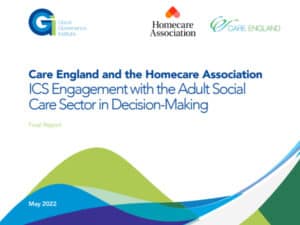Collaborative whitepaper sets out important plans for engaging adult social care in ICSs
A whitepaper designed to explore the extent to which the adult social care (ASC) sector is being appropriately engaged in the ongoing development of ICSs has been launched by the Good Governance Institute (GGI), Care England and the Homecare Association.
The purpose of an ICS is to deliver properly joined up care, so that people accessing health and care services experience them as seamlessly as possible.
It is a statutory partnership between NHS organisations and local authorities to better meet health and care needs across an area. Despite this, it seems that effective engagement among ICSs with the ASC sector has not been consistent, according to the whitepaper.
Jane Townson, CEO of the Homecare Association, commented: “Homecare services play a vital role, alongside housing, health and other community-based services, in enabling us all to live well at home and flourish in our communities.
“People receiving services need to experience seamless support from professionals and volunteers. It is therefore paramount to create a culture of collaboration between partners, focused on meeting the needs of people living at home.
“We thus strongly encourage Integrated Care Systems (ICSs) to engage effectively with homecare providers and develop the huge potential that joined up care systems offer.
“Investing in multi-disciplinary support for people to maintain their health and well-being at home helps to enhance healthy life expectancy, which benefits individuals and their families, reduces pressure on the NHS and reduces costs in health and care systems.”
Recently, much of the focus in healthcare has been more on post-pandemic restoration and recovery, although even that situation still seems to be changing rapidly, the whitepaper emphaises.
Martin Green, CEO of Care England, said: “In order for ICSs to succeed, social care providers must be heard. We urge all ICS leaders to carefully consider the key recommendations in this paper to ensure that integration works for both health and social care.”
Overview of the key ambitions from the integration whitepaper
The whitepaper sets out some of the ways ICSs should work with ASC providers and local care associations to provide better care services to adults.
As an overview, these recommendations include:
- ICSs note that the social care partner member on the integrated care board (ICB) will not necessarily be able to effectively represent providers, and therefore, ICSs should work with providers to develop more effective engagement mechanisms.
- ICSs should develop a plan about how to engage with ASC providers and involve them in the process.
- ICSs should have a provider forum or liaise with local care associations which nominates a representative to the ICS partnership board.
- ICSs should ensure that ASC providers have a role in the new local place arrangements, the integrated care partnership (ICP) and/or the ICB. Perhaps through the creation of a paid position that is tasked with furthering the ASC agenda and educating others around them on the issues facing the sector.
- The Department of Health and Social Care publishes a specific framework for ICS engagement with the ASC sector.
Andrew Corbett-Nolan, CEO of GGI, stated: “Engagement with adult social care is essential to the success of integrated care systems (ICSs) and the development of health and social care services.
“This paper comes at an essential time for engagement with key partners across the system, to enable connections between health and social care.”
Earlier this year, patients were set to receive better, more joined-up care according to new plans published by the Department of Health and Social Care (DHSC) to improve the links between health and social care by breaking down barriers, pooling budgets, and focusing on shared outcomes and accountability.


